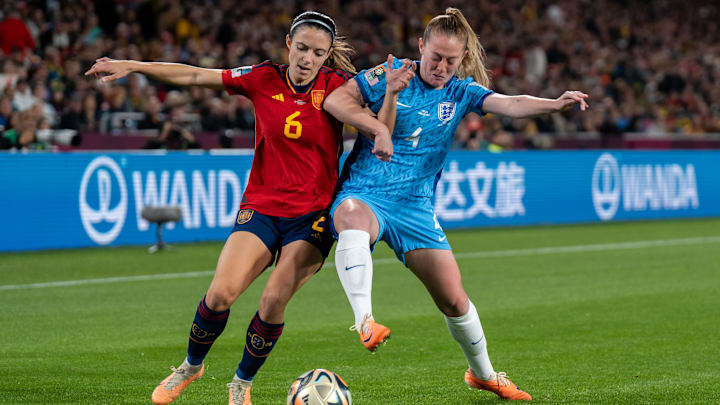England's Blueprint to Dethrone Spain and Claim Women's Euro 2025 Glory

It felt inevitable. A month earlier, 16 nations began their Euro 2025 journey, yet it appeared predetermined that England and Spain would meet in the final showdown.
The narrative of an emerging global football rivalry unfolds naturally. This England vs. Spain encounter represents a rematch of the women's World Cup final from Sydney two years prior. During that memorable evening, Spain edged past England with a 1–0 victory to claim the World Cup trophy, courtesy of Olga Carmona's decisive strike.
Sunday's encounter in Basel, Switzerland, serves as the follow-up chapter. But what strategy can England employ to neutralize a Spanish squad widely regarded as possessing the world's finest attacking arsenal, and which has been the tournament's most commanding force at women's Euro 2025?
Moving forward without resentment
During Thursday's press conference, Keira Walsh spoke candidly about the England vs. Spain "rivalry." Nevertheless, she avoided suggesting that England would seek retribution for the World Cup final defeat.
While revenge might serve as motivation, England appears determined to move past that crushing evening at Stadium Australia two years ago. Though Walsh acknowledged that England's performance wasn't "our finest" and represented a "huge letdown," she maintains that dwelling on history could impede England's preparation for the upcoming European final.
"As a footballer, you risk becoming overly emotional. If you lean too heavily into those feelings, you'll be too charged up, with too many distractions. This is a fresh match, a different squad," Walsh explained.
Fourteen members of England's 23-player Swiss squad retain memories from taking the field in Sydney during the 2023 World Cup. Meanwhile, only 10 players from Spain's World Cup-winning roster are vying for European glory. Both teams will feature significant personnel changes.
Neutralize threats beyond Aitana Bonmatí
Naturally, two-time Ballon d'Or recipient Bonmatí will draw considerable focus from England's defensive unit in the final. Despite limited playing time early in Euro 2025 due to illness, the Barcelona playmaker has been phenomenal throughout the knockout phase.
Bonmatí delivered the backheel assist for Spain's opener against Switzerland in the quarterfinal, then netted the decisive goal from an seemingly impossible position against Germany in the semifinal. She possesses magical ball skills, perceiving opportunities that escape other players entirely.
However, England cannot afford the luxury of assigning two defenders to Bonmatí or dedicating someone to shadow her constantly. This limitation exists because Spain's midfield ranks among the world's most envied units.
"If you attempt to neutralize her [Bonmatí], Patri [Guijarro] has been among this tournament's standout performers, so focusing on Aitana leaves you vulnerable to Patri, plus Alexia [Putellas] and Mariona [Caldentey]. Therefore, we're not concentrating on any single individual," Walsh stated.
Putellas currently tops the tournament in goal contributions with three strikes and four assists. Spain's midfielders will float seamlessly between zones, carefully observing England's defensive movements before exploiting gaps with precise passing. The Lionesses must maintain peak concentration levels.
Maintain intensity without possession
In the semifinal, Germany became the first team to keep Spain scoreless through regulation since England's 1–0 victory over Spain in February 2025. Germany's approach involved absorbing pressure and accepting Spain's possession advantage, while maintaining structural discipline to prevent Spain from establishing rhythm and penetrating the penalty area.
Germany managed 40% possession in their semifinal against Spain, nearly matching England's 41% possession rate in their 1–0 triumph over La Roja. The Lionesses must accept this scenario will likely repeat, with their defensive organization potentially determining the outcome.
Should England press too aggressively attempting to regain possession, it could create larger spaces for Spain to capitalize on. England must demonstrate considerable restraint in controlling territory and maintaining formation, while avoiding vulnerability during transitions.
"For us, it's about remaining patient without the ball. We can't panic or become frustrated. We must feel comfortable in our defensive duties," Walsh emphasized.
Ready the reinforcements
England's tournament has been characterized by head coach Sarina Wiegman's tactical flexibility and the contributions of substitutes Chloe Kelly and Michelle Agyemang. Every goal in the Lionesses' stunning comeback victories in the quarterfinal against Sweden and semifinal against Italy was either scored or set up by this bench duo.
England's starting striker, Alessia Russo, may have found the net just once in Switzerland, but her tireless work has helped exhaust opponents, creating opportunities for the impactful reserves when they enter during the second half.
If England can maintain parity or stay within striking distance of Spain, the Lionesses will maintain confidence that their substitutes can salvage the final. However, England isn't alone in possessing match-winners among their reserves.
Athenea Del Castillo and Salma Paralluelo offer a completely different attacking approach compared to Clàudia Pina and Esther González, should Spain require tactical adjustments. As demonstrated in the Germany semifinal, Spain willingly adopts more direct play and executes swift medium-range passes to shift possession and attack vacant spaces. This additional tactical flexibility could prove devastating.
More Soccer on Sports Illustrated




